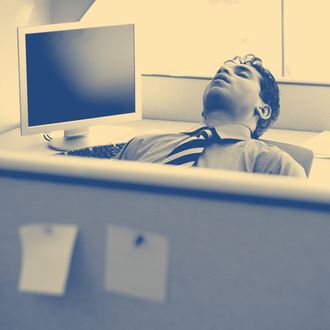
Sometimes you’re at work and you just have to watch that one cute cat-/dog-/panda-playing-in-the-snow video. And then you spot that girl from high school on your Facebook feed and wonder what she’s been up to all these years … Would you look at that? It’s lunchtime! Time to skip out of work for an hour and wait in an obnoxiously long cafeteria line with your co-workers and dissect that cute animal video you just saw.
But exactly how much time are we wasting at work? That’s what a group of economists — Michael Burda, Kaie Genadek, and Daniel Hamermersh — wanted to find out, and they’ve published their results in a new National Bureau of Economic Research working paper.
Using the self-reported American Time Use Survey, the economists found that, on average, workers spent about 34 minutes per day not working. Doesn’t seem a lot, right? But when the economists got rid of the people who claimed they didn’t spend any time slacking off (uh-huh, right), the figure rose to 50 minutes. About half that time wasted was spent on eating, the other half on “leisure” activities (watercooler break!).
Perhaps unsurprisingly, not everyone wasted the same proportion of the workday. The authors explained that, all else being equal, the more someone worked, the higher the proportion of the time they slacked off — until about 42 hours a week. The more time in the office workers logged above this level, the less they slacked off, proportionally. Those eager-beaver, first-to-arrive-and-last-to-leave types seemed more capable of resisting the lure of internet cats than the rest of us.
Like any research based on self-reported statistics, there are some limitations here, simply because there could be various biases to how people estimated or reported the amount of time they spent slacking. It’s also important to realize that slacking tendencies may vary a great deal over time, depending on the economy. In a section of the paper titled “To Loaf or Not to Loaf: That Is the Question,” the economists note that recessions make slacking off more of a luxury than during a “normal” economy, as worker jobs hang in the balance and are at risk of being axed. The data was from 2003 to 2012, so it captured much of the recession, meaning it may be that we’re slacking more these days than we were back then, given that the economy’s a bit stronger.
But maybe the simpler point to keep in mind here is that not all slacking is bad. In fact, as the Science of Us noted earlier this month in a video, taking breaks is a good thing, both for your mind and creative output. Afternoon naps are a treasured part of Japanese work culture, and working for more than four and a half hours at a time actually leads to a diminishing rate of productivity. In fact, some researchers think the ideal work/break balance comes out to 17 hard-earned minutes of fun time for every 52 minutes of work. If you calculate that for a ten-hour day, that comes out 147.8 minutes — or over two hours — of “loafing” time.
So take heart, worker: You’re not a lazy bum straight off the set of The Office. You’re merely taking a brain break.




